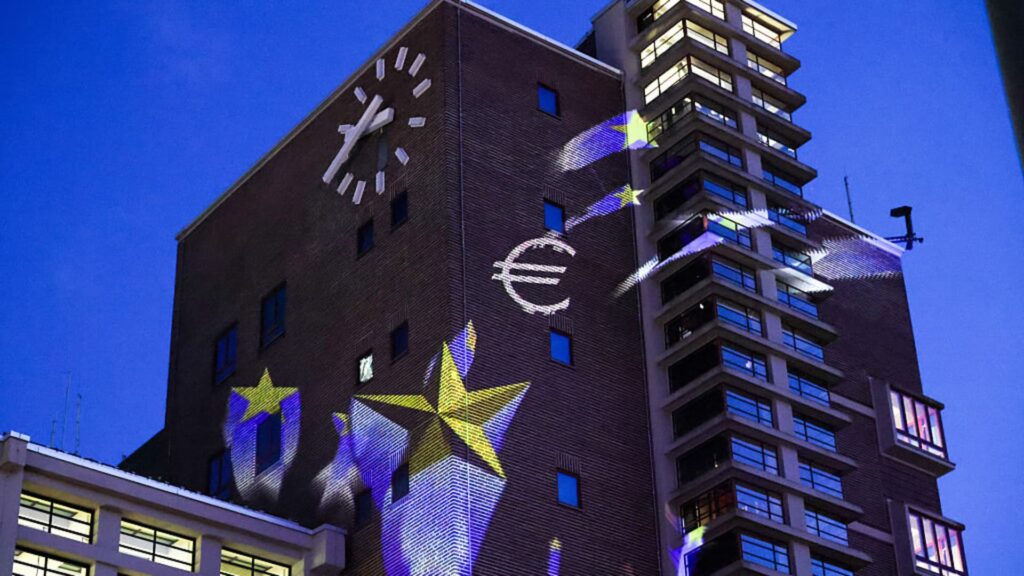The European Central Bank left interest rates unchanged at its latest board meeting on Thursday, as expected.
The central bank kept its key deposit facility rate unchanged at 2% for the third time in a row, last cutting it in June. The adjustment coincided with eurozone inflation reaching the ECB’s 2% target rate and was part of a rate-cutting cycle that lowered interest rates from last year’s record high of 4%.
“Inflation remains close to the medium-term target of 2% and the Governing Council’s assessment of the inflation outlook remains largely unchanged,” the ECB said in a statement on Thursday.
“Despite the challenging global environment, the economy continues to grow. A strong labor market, strong private sector balance sheet, and the Board’s past rate cuts remain important sources of resilience,” the report said.
However, it cautioned that “the outlook remains uncertain, particularly due to ongoing global trade disputes and geopolitical tensions.”
Eurozone inflation rose slightly in September to 2.2% from 2% the previous month, but the rise was due to higher prices for services, and economists said the central bank was likely to remain cautious in intervening in interest rates at this time.
Expectations that the ECB will keep interest rates unchanged were strengthened after preliminary euro zone economic growth figures released early on Thursday showed that the economy grew 0.2% in the third quarter compared to the previous three months. The numbers were better than expected and showed that economic activity remains resilient despite widespread uncertainty over business activity due to U.S. trade tariffs.
ECB President Christine Lagarde told reporters that while the services sector continues to grow, supported by strong tourism and a recovery in digital services, manufacturing “is held back by higher tariffs, continued uncertainty and a strong euro.”
He added that the disconnect between external and domestic demand is “likely to persist” in the short term. “As real incomes rise, the economy should benefit from more consumer spending,” Lagarde said.
“From a monetary policy perspective, we’re in a good position,” Lagarde told CNBC’s Annette Weisbach. “Is it a fixed, good place? No. But we’ll do whatever it takes to make sure we stay in a good place.”
Illumination projection commemorating the 75th anniversary of the Schumann Declaration on the Grossmarkthalle building of the European Central Bank headquarters in Frankfurt, Germany, on May 9, 2025.
Alex Kraus/Bloomberg via Getty Images
After the ECB’s announcement, the euro reversed earlier gains and traded 0.26% lower against the dollar at $1.1571.
“What a boring announcement,” Mike Cope, chief investment officer for Europe, Middle East and Africa at Morningstar Wealth, told CNBC on Thursday.
“The fact that inflation is actually back to near normal is incredible, so it’s not surprising that we’re not rushing to change rates,” he told CNBC’s “Decision Time.”
“The big picture is that Europe is still adjusting to the triple shock of the loss of cheap energy, deteriorating trade terms with the United States, and the need to increase defense spending. On top of those three things, with the United States currently sucking investment from the rest of the world, Europe is not being given the same stimulus to support growth that we’ve seen in the United States,” he told CNBC’s Karen Tso.
data dependencies
The central bank has repeatedly said it will take a data-driven approach to setting interest rates at each meeting, and reiterated that stance on Thursday. But ECB Governing Council officials told CNBC this month that the easing cycle is at or near the end.
Martin Kocher, a member of the European Central Bank’s board and president of the Austrian National Bank, said Europe would be “okay” as long as nothing “drastic” happens.
“Right now, I think we’re in a good position, so there’s no reason to change anything unless there are changes that force us to do something,” Kocher told CNBC’s Karen Tso at the IMF and World Bank annual meetings in Washington.
“And in the bigger picture, certainly the mitigation cycle is at or near the end, but there’s no reason to pre-commit at that stage.”
In a separate interview, ECB Governing Council member François Villeroy de Galhau said he recommended “agile realism” when it comes to the direction of interest rates, adding: “We are in a good position…but a good position is not a fixed position.”
A mid-October Reuters poll found a majority of economists said the ECB would keep deposit rates unchanged this year, but 45 of the 79 economists surveyed (57%) said no changes were expected by the end of 2026.
— CNBC’s Tasmin Lockwood and Leonie Kidd contributed reporting to this story.


